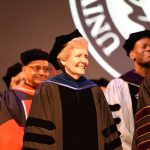Rachel E. Gabriel and Sarah L. Woulfin of the University of Connecticut ask a simple but very important question: Isn’t it time to redesign teacher evaluation? Most states are stuck with laws they wrote to apply for Race to the Top funding. Nearly a decade has passed. We now know that test-based evaluation has failed. Why are so many states and districts holding on to a failed strategy for evaluating teachers? Is it inertia? Apathy?
“It’s a moral hazard issue — a devil’s bargain,” Preston Green, a professor of education leadership and law at the University of Connecticut, said after reviewing the contract between the school and K12. “These districts need the money, are responsible for these students but the students are not a part of them. The question becomes: How concerned is the district going to be? It just doesn’t have the incentive to focus on these students. They’re just dollars to them.”
A recent national survey reported that millennials are struggling with their knowledge of the Holocaust. The survey results show that 22 percent of millennials have not heard of, or are not sure if they have heard of the Holocaust, and that 66 percent could not identify Auschwitz.
“A recent national survey reported that millennials are struggling with their knowledge of the Holocaust,” says Alan Marcus, associate professor of curriculum and instruction at the Neag School. “The survey results show that 22 percent of millennials have not heard of, or are not sure if they have heard of the Holocaust, and that 66 percent could not identify Auschwitz.”
“As a scholar of Holocaust education and teacher education, I argue that knowledge of specific facts is only a small part of knowing about any historical event, including the Holocaust.”
Del Siegle, professor and associate dean for research and faculty affairs at UConn’s Neag School of Education is interviewed about his career and expertise in gifted education by National Association for Gifted Children (NAGC) member and Neag School alum Carla Brigandi ’15 Ph.D., now assistant professor of gifted education at West Virginia University.
States must consider: Is their teacher evaluation improving teaching and learning or getting in the way of the very work it was designed to support?
Recently Morgaen Donaldson and Shaun Dougherty presented early results from their IES-funded study on principal evaluation policies at the AERA national conference.
Mary Anne Doyle began her career at the University of Connecticut’s School of Education in 1983 as an assistant professor. She will retire this month after a 35-year career as an administrator and faculty member.
In December 2017, the Associated Press conducted an analysis of charter school enrollment nationwide and found that the schools were among the most racially segregated in the nation. “we’re not taking seriously the dangers that privatization creates,” says Professor Preston Green.
Congratulations to our Neag School alumni, faculty, staff, and students on their continued accomplishments inside and outside the classroom. If you have an accolade to share, we want to hear from you! Please send any news items and story ideas to neag-communications@uconn.edu.



